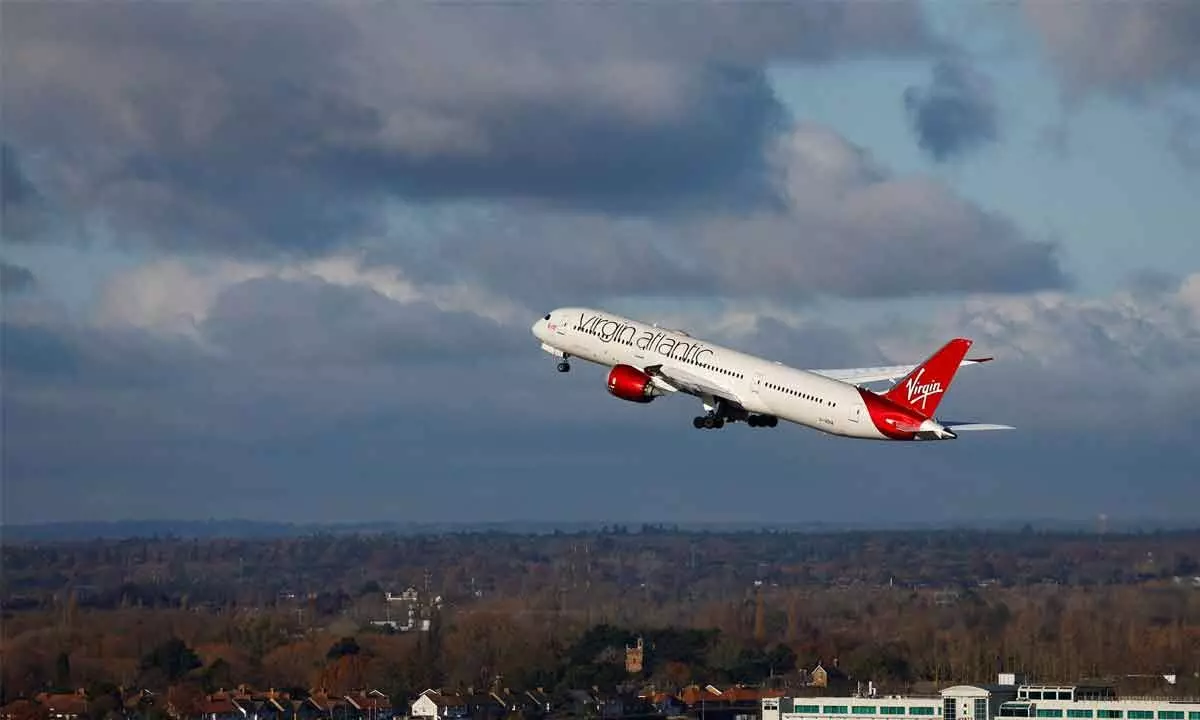Live
- NASA Unveils Underwater Robots for Exploring Jupiter's Moons
- Additional Central forces arrive in violence-hit Manipur
- AR Rahman and Saira Banu’s Divorce: Legal Insights into Common Issues in Bollywood Marriages
- 82.7 pc work completed in HPCL Rajasthan Refinery area: official
- Curfew relaxation extended in 5 Manipur districts on Friday
- Tab scam prompts Bengal govt to adopt caution over fund disbursement
- Tata Power inks pact with ADB for green projects worth $4.25 billion
- Globus Spirits Limited introduces India Single Malt under the brand DŌAAB India Craft Whisky
- BGT 2024-25: No greater honour to lead India in Test cricket, says Bumrah ahead of series opener
- NMO Bharat calls for apology from Rahul Gandhi over ageist remarks about Joe Biden
Just In
Unprecedented challenges & desire for change


The first transatlantic flight – A Virgin Atlantic Boeing 787 Dreamliner – using 100% pure sustainable aviation fuel (SAF) took off from Heathrow,...
The first transatlantic flight – A Virgin Atlantic Boeing 787 Dreamliner – using 100% pure sustainable aviation fuel (SAF) took off from Heathrow, London, for New York JFK, on Tuesday, November 28. SAFs are produced from renewable biomass and waste resources that can be used in jet fuel in modern aircraft to a maximum of 50 per cent. This is a good augury for the global climate meet starting today in Dubai. The COP28 (Conference of Parties) is taking place at Expo City, Dubai, from 30 November to 12 December 2023.We need a phase-out of fossil fuels if we are to be close to keeping global temperature rise under 1.5C, to avoid worse impacts of climate change seen in 2023. Then why should a global mission to avert climate catastrophe be chaired by the head of the UAE national oil company, ADNOC, which is all set to increase production from 4 million to 5 million barrels a day by 2027? This shows realisation, even on the part of petro-states like Dubai, of the grave crises in store for the planet that spare none and respect no national boundaries.
The COP is the supreme decision-making body of the United Nations Framework Convention on Climate Change (UNFCCC) established through an international environmental treaty on March 21, 1994 to combat dangerous human interference with the climate system. The first COP meeting was held in Berlin in 1995. For 20 years, the COP meets saw deliberations, charges and counter charges and, finally, the fruition of the Paris Agreement in 2015, where it was unanimously vowed to keep global warming below 2 ºC above pre-industrial and continue efforts to limit it to 1.5 ºC.
The COP-27 held at Sharm El-Sheikh (Egypt) reached an agreement to create a loss and damages fund for countries struggling to deal with climate catastrophes. But it saw no agreement on phasing down all fossil fuels. COP27, nevertheless, committed industrialised countries and economies to meet the individual targets. Sadly, it did not agree on the likelihood of global greenhouse gas emissions peaking by 2025, which would have been an ambitious advance on the 2030 target. Beyond Oil Gas Alliance (BOGA), created by Costa Rica and Denmark, forecasts that in 2030, governments’ production plans and projections would lead to around 240% more coal, 57% more oil, and 71% more gas than would be consistent with limiting global warming to 1.5°C.
According to a UN report, a reduction of 43 per cent in GHG emissions from 2019 levels by 2030 is what’s needed if the target of limiting temperature rise to 1.5C above pre-industrial levels is to be met. Also, with world’s population expected to reach 9 billion by 2050, food security and food systems transformation are yet to figure at the global climate meet.At COP26 in Glasgow, PM Modi had unveiled Panchamrit, outlining India’s 5 climate goals: becoming “net zero”, or carbon neutral by 2070; committing at least 500 GW of energy by 2030 from non-fossil sources; cutting carbon emissions by a billion tonnes; reducing the carbon-intensity of the economy by 45%; and, meeting half of its energy requirements from renewable energy by 2030. He is likely to spell out challenges and measures to overcome the same. India as G20 head also committed the members to triple their installed renewable energy capacity by 2030. The stakes at COP28 are exceptionally high, following a spate of natural disasters, exacerbated by climate change, in 2023.

© 2024 Hyderabad Media House Limited/The Hans India. All rights reserved. Powered by hocalwire.com






